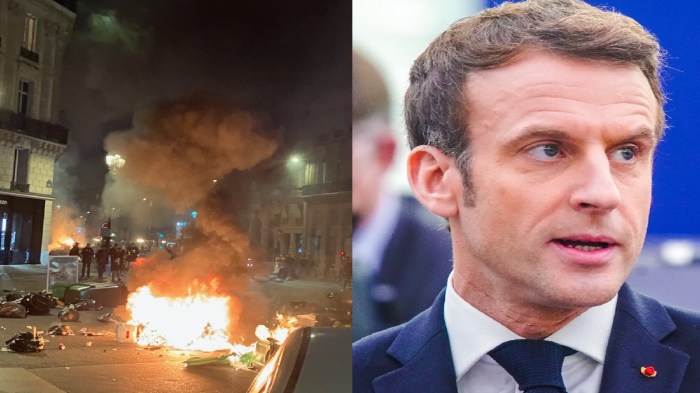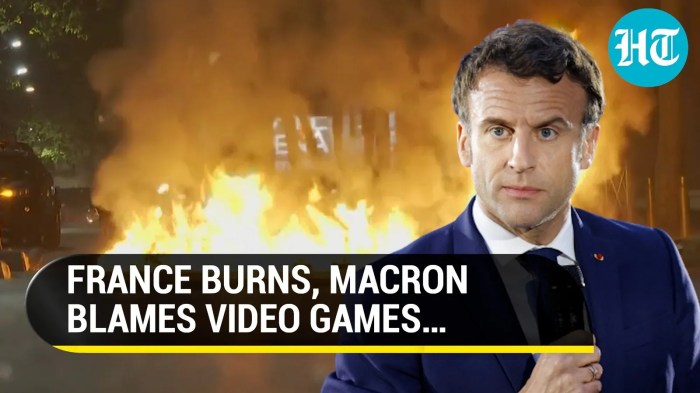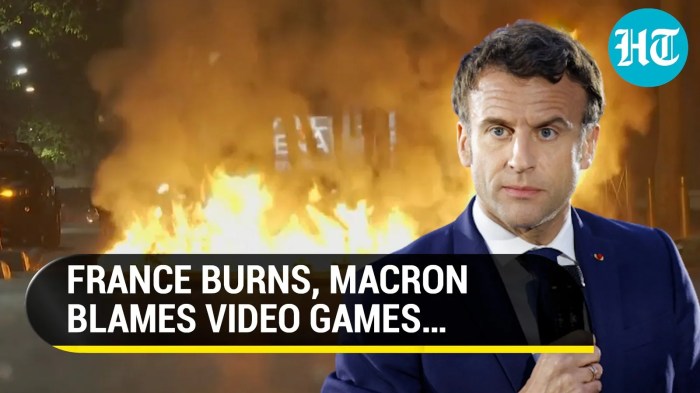Social problems blamed on video games france riots macron – Social problems blamed on video games, France riots, Macron’s response – these are the threads woven into a complex tapestry of unrest that shook France in recent times. The events ignited a firestorm of debate, with some pointing fingers at the influence of violent video games, while others highlighted deeper societal issues.
This blog dives into the heart of this controversy, exploring the roots of the riots, the role of video games in the narrative, and the government’s response.
The riots erupted in response to the fatal shooting of a teenager by police, sparking widespread anger and frustration. This tragic event, however, was just the tip of the iceberg, revealing underlying social tensions fueled by economic inequality, high unemployment rates, and a sense of alienation among marginalized communities.
This simmering discontent had been brewing for years, culminating in a powerful outpouring of frustration and anger.
The French Riots
The recent riots in France, which erupted in June 2023, have sent shockwaves across the nation and beyond. While the immediate trigger for the unrest was the fatal shooting of a 17-year-old boy by police, the riots are deeply rooted in a complex tapestry of social and economic grievances that have simmered for years.
The Trigger: A Tragic Incident
The riots were sparked by the death of Nahel M., a 17-year-old boy of Algerian descent, who was fatally shot by a police officer during a traffic stop in Nanterre, a suburb of Paris, on June 27, 2023. The incident was captured on video, which quickly went viral and ignited widespread public outrage.
The video showed the officer pointing his gun at Nahel’s chest moments before firing. The officer’s actions were widely condemned, with many accusing him of using excessive force and racial bias. The officer was subsequently charged with voluntary homicide and is currently awaiting trial.
Socio-economic Context: A Deepening Divide
The riots in France are not simply a reaction to a single incident, but rather a manifestation of deep-seated social and economic tensions. France has long grappled with issues of inequality, poverty, and unemployment, particularly in marginalized communities. The riots have highlighted the persistent challenges faced by many young people from underprivileged backgrounds, who feel excluded from opportunities and ignored by the government.
- High Unemployment:France has a persistent problem with unemployment, particularly among young people. The unemployment rate among those under 25 years old is significantly higher than the national average.
- Income Inequality:France has a wide gap between the rich and the poor, with the wealthiest 1% of the population owning a disproportionate share of the country’s wealth.
- Housing Crisis:Many young people in France struggle to find affordable housing, especially in major cities like Paris. This issue is particularly acute in disadvantaged neighborhoods where access to quality housing and basic services is limited.
- Police Brutality:Allegations of police brutality and racial profiling have been a persistent problem in France for decades. The shooting of Nahel M. was just the latest in a series of incidents that have fueled distrust and anger towards law enforcement.
Echoes of the Past: A Recurring Pattern
The current unrest in France echoes previous instances of social unrest in the country, such as the 2005 riots, which were triggered by the deaths of two teenagers who were electrocuted while hiding from police. These earlier riots also highlighted issues of social exclusion, police brutality, and economic disparities.
The riots of 2023, however, are taking place against the backdrop of a deepening sense of social and political polarization. France has been grappling with a rise in populism and far-right sentiment, which has fueled tensions between different communities and exacerbated existing divisions.
The riots have exposed the fragility of social cohesion in France and the need for urgent action to address the underlying causes of unrest.
The Role of Video Games in the Narrative
In the wake of the recent riots in France, a familiar scapegoat has emerged: video games. Many have pointed to the violent content of some games as a contributing factor to the unrest, claiming that they desensitize young people to violence and contribute to a culture of aggression.
While it is tempting to seek simple explanations for complex social phenomena, attributing the riots solely to video games is a gross oversimplification that ignores the multifaceted and systemic issues at play.
The Argument for Video Game Influence
Those who blame video games for the riots often cite the prevalence of violent video games in society and the potential for these games to influence players’ behavior. They argue that exposure to graphic violence in games can desensitize individuals to real-world violence, making them more likely to engage in aggressive or destructive behavior.
For example, some point to the popularity of games like Grand Theft Auto, which feature scenarios involving crime, violence, and mayhem, as evidence of a culture that glorifies and normalizes violence.
- Desensitization:Research suggests that exposure to violent media, including video games, can desensitize individuals to violence, making them less emotionally affected by it. This desensitization can potentially lead to increased aggression and a reduced sense of empathy for victims of violence.
- Aggression:Numerous studies have shown a correlation between playing violent video games and increased aggression in players. However, it’s important to note that correlation does not equal causation. While some studies have found a causal link, others have shown that the relationship is complex and influenced by other factors such as personality, social environment, and individual vulnerability.
Alternative Perspectives on Video Games
While the potential influence of violent video games cannot be ignored, it’s crucial to consider alternative perspectives and avoid simplistic causal relationships.
- Complex Social Factors:The riots in France are rooted in a complex web of social, economic, and political factors, including poverty, inequality, police brutality, and a sense of marginalization among young people. Attributing the riots solely to video games ignores these fundamental issues and deflects attention from the need for systemic change.
- Positive Aspects of Video Games:Video games can offer numerous positive benefits, such as enhancing cognitive skills, fostering creativity, and promoting social interaction. Many games encourage problem-solving, teamwork, and strategic thinking, which can be valuable skills in real life. Focusing solely on the negative aspects of video games overlooks these potential benefits and ignores the vast diversity of gaming experiences.
- Need for a Nuanced Approach:It’s important to adopt a nuanced approach when considering the role of video games in society. While violent content can have negative consequences, it’s essential to acknowledge the potential benefits of gaming and to understand that the impact of video games is influenced by a range of individual and contextual factors.
Finish your research with information from social impact startups joining accelerator.
The Macron Government’s Response

The French government, under President Emmanuel Macron, faced a significant challenge in responding to the widespread riots that erupted across the country in June and July 2023. The unrest, fueled by a complex mix of socioeconomic grievances, police brutality, and the controversial police killing of Nahel M., required a multifaceted approach that sought to address both the immediate crisis and the underlying causes of discontent.
The Macron government’s response was characterized by a combination of security measures, social policy initiatives, and communication strategies. These measures aimed to restore order, alleviate the concerns of the protesters, and address the systemic issues that contributed to the unrest.
Security Measures
The French government swiftly deployed a large-scale security force to quell the riots, deploying thousands of police officers and gendarmes to troubled areas. This included the use of riot control measures, such as tear gas and water cannons, to disperse protesters and protect public property.
- The government also implemented a curfew in several cities, restricting movement and gatherings during nighttime hours.
- Additionally, the government deployed armored vehicles and military personnel to maintain order and deter further violence.
While these security measures were successful in restoring order and reducing the scale of the riots, they also faced criticism for their heavy-handedness and potential for escalation. Human rights groups expressed concerns about the use of excessive force by law enforcement and the potential for disproportionate targeting of marginalized communities.
Social Policy Initiatives
In an effort to address the underlying grievances of the protesters, the Macron government announced a series of social policy initiatives. These included measures aimed at improving living standards, tackling poverty and inequality, and addressing concerns about police brutality.
- The government pledged to increase the minimum wage and provide financial assistance to low-income families.
- It also announced plans to invest in public housing and infrastructure in disadvantaged neighborhoods.
- In response to concerns about police brutality, the government pledged to reform police training and accountability mechanisms.
These social policy initiatives were met with mixed reactions. While some welcomed the government’s commitment to addressing social inequalities, others criticized the measures as insufficient and lacking concrete action. Critics argued that the government’s focus on security measures overshadowed its efforts to address the root causes of the unrest.
Communication Strategies
The Macron government employed a combination of communication strategies to manage public opinion and address the concerns of the protesters. These included public pronouncements by President Macron, engagement with community leaders, and the use of social media to disseminate information and promote dialogue.
- President Macron addressed the nation on multiple occasions, condemning the violence while emphasizing the government’s commitment to addressing the grievances of the protesters.
- The government also engaged with community leaders and representatives from marginalized groups to gather feedback and build trust.
- Social media platforms were used to disseminate information about government initiatives and encourage dialogue between citizens and officials.
While these communication strategies aimed to foster dialogue and build trust, they faced challenges in reaching and persuading those most affected by the riots. Critics argued that the government’s communication was often perceived as condescending and out of touch with the realities of life in disadvantaged communities.
The Impact on French Society

The riots that erupted in France in the wake of the police killing of Nahel M. have left a lasting impact on French society, both in the immediate aftermath and in the long term. The widespread destruction of property, disruption of public services, and the heightened polarization of public opinion have left their mark on the nation’s social fabric.
The Immediate Impact of the Riots
The immediate impact of the riots was a palpable sense of fear and uncertainty. The widespread destruction of property, particularly in urban areas, caused significant economic damage and disrupted the lives of many citizens. The riots also led to a significant increase in crime, including looting and arson.
This resulted in a heightened sense of insecurity and fear, particularly in vulnerable communities.
The Long-Term Impact of the Riots
The long-term impact of the riots is likely to be more complex and multifaceted. The riots have exacerbated existing social tensions and inequalities, highlighting the deep-seated issues of poverty, discrimination, and social exclusion that plague many French communities.
The Potential for Positive Change
While the riots have brought about a great deal of disruption and destruction, they have also sparked a national conversation about the issues that lie at the heart of the unrest. The riots have forced the French government to confront the reality of systemic racism, police brutality, and social inequality.
They have also highlighted the need for greater investment in marginalized communities and the importance of addressing the root causes of social unrest.
The Impact on the Macron Government
The riots have dealt a significant blow to the political legitimacy of President Emmanuel Macron and his government. The government’s response to the unrest has been widely criticized as being too slow and ineffective. The riots have also damaged Macron’s reputation as a competent and decisive leader, and they have raised questions about his ability to effectively address the challenges facing France.
The Potential for Further Unrest
The riots have also raised concerns about the potential for further unrest in the future. The underlying social and economic problems that sparked the riots remain unresolved. If the government fails to address these issues, there is a risk that the current unrest could reignite or escalate into something more serious.
The International Perspective: Social Problems Blamed On Video Games France Riots Macron
The French riots, while seemingly specific to France, offer a glimpse into the global landscape of social unrest. Examining similar events across the globe reveals both commonalities and differences, shedding light on the underlying causes and potential implications.
Comparisons with Other Social Unrest
The French riots share similarities with other instances of social unrest worldwide, particularly in countries facing economic inequality, political instability, and social marginalization. For example, the 2011 Arab Spring uprisings, fueled by economic hardship and political repression, resonated with the French protests, highlighting the shared grievances of marginalized communities across the globe.
Similarly, the 2019 Hong Kong protests, sparked by concerns over political autonomy and human rights, reflected a global trend of citizens demanding greater accountability and transparency from their governments.
- Economic Inequality:The French riots, like many other social unrest events, were fueled by economic inequality and the perception of a widening gap between the rich and the poor. This resonates with the “Occupy” movements that emerged in the 2010s, highlighting the growing discontent with economic systems perceived as unfair.
- Political Disillusionment:The riots also reflected a growing sense of political disillusionment and distrust in the government’s ability to address the concerns of its citizens. This echoes the “Yellow Vest” protests in France, which began as a response to fuel tax increases but evolved into a broader movement against the perceived disconnect between the government and the people.
- Social Marginalization:The riots highlighted the plight of marginalized communities, particularly in the suburbs, who felt neglected and ignored by the government. This aligns with the Black Lives Matter movement in the United States, which brought attention to the systemic racism and police brutality faced by Black communities.
International Media Coverage
International media coverage of the French riots presented diverse narratives and perspectives. While some outlets focused on the violence and destruction, others emphasized the underlying social and economic grievances driving the protests.
- Focus on Violence:Some media outlets, particularly those with a focus on sensationalism, emphasized the violence and destruction associated with the riots, portraying the protesters as unruly and destructive. This approach often neglected the deeper causes and grievances fueling the unrest.
- Highlighting Social Issues:Other media outlets provided more nuanced coverage, exploring the social and economic factors driving the riots, including poverty, inequality, and police brutality. This approach offered a more comprehensive understanding of the complex factors contributing to the unrest.
- Political Polarization:The media coverage often reflected existing political divides, with some outlets aligning with the government’s perspective and others offering a more critical view. This polarization contributed to a fragmented understanding of the events and hindered constructive dialogue.
Implications for Other Countries, Social problems blamed on video games france riots macron
The French riots serve as a stark reminder of the potential for social unrest in countries facing similar challenges. The events highlight the importance of addressing social and economic inequalities, promoting political accountability, and ensuring that marginalized communities have a voice in the political process.
- Addressing Inequality:The riots emphasize the urgent need for governments to address economic inequality and create opportunities for all citizens. This includes investing in education, healthcare, and social safety nets to reduce poverty and improve living standards.
- Promoting Political Participation:The riots underscore the importance of ensuring that all citizens have a voice in the political process. This requires promoting political participation, ensuring free and fair elections, and addressing concerns about government corruption and lack of transparency.
- Building Social Cohesion:The riots highlight the need for governments to foster social cohesion and address the grievances of marginalized communities. This includes investing in community development programs, promoting dialogue and understanding between different groups, and addressing issues of discrimination and social exclusion.



